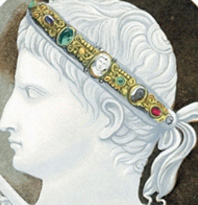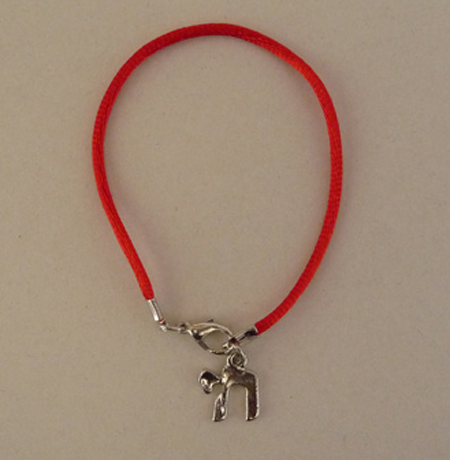The Baal Shem Tov – Early Years – Part 20
In the last episode, the Baal Shem Tov moved to Tlust, the city where he was raised by his parents, and started to use his holy powers to give blessings and heal people.
When he told them that he had to leave to heal a sick child, and thereby help a community of Jews, the people of Tlust looked at him blankly, not understanding what he meant. His little son Tzvi, however, remembered something that the Baal Shem Tov had once said: that while he prays in great devotion, even though he only reaches the lower worlds of heaven, he can learn events of the future there – because there, the judgments are proclaimed about what is to happen on earth. So Tzvi understood that his father must have heard something proclaimed which told him that he would be needed in Pelitz to rescue the Jews there from danger.
"Take me along with you," Tzvi begged his father. The Baal Shem agreed. As they went to the coach-and- horses, the people of Tlust escorted them, blessing the Baal Shem Tov that he should succeed in his purpose, and he should return safely, in good health.
Usually, the trip from Tlust to Pelitz was hardly a single day's journey. With the coach harnessed to four fine horses, they should easily have reached Pelitz the same day. Yet one thing after another happened to .delay them and slow their pace. The wealthy man kept whipping the horses to make them run faster, and he remained certain that they would reach Pelitz before nightfall. As dusk fell, however, they were still far from the town, and they were forced to stop for the night at an inn, in the town of Fistin.
It did not take them long to learn that the Jews of the town had made the day a time of fasting, because they were in great trouble. They were all deeply worried and frightened, even on the verge of tears. "Whatever Is the matter?" asked the wealthy man of one person. "Why all the sorrow and worry?"
The answer explained why they were troubled. The daughter of the Polish nobleman who owned the town lost her senses. She had suddenly lost her mind and was acting like an insane person. This nobleman had always disliked the Jews, and whenever he found a chance, he would cause them trouble and distress. When his daughter turned insane, he ranted and shouted that the Jews of his little town were to blame. He claimed that they had prayed for this terrible thing to happen. If not for their evil prayers, he roared, his daughter would have been fine. He therefore proclaimed that the Jews of Fistin must begin praying at once for his daughter to be well; and if in three days she did not recover and become healthy again, he would expel them all – drive every last Jew out of Fistin; and he would take away everything they owned. They would be left penniless in the world, without a home to take shelter in.
It was these woe-stricken Jews of Fistin who told this to the wealthy man of Pelitz. "Well," he told them, "I have the very same trouble as your Polish nobleman. My daughter has also gone out of her mind – lost her senses. So I have taken this man with me, the Baal Shem Tov of Tlust, to cure her. Take him to your dreadful nobleman to cure his daughter, and you will all be out of trouble." These Jews lost no time, and soon everyone in the town knew that the Baal Shem Tov was there, in Fistin.
All gave a great sigh of relief, and almost wept for happiness. Heaven alone must have sent him, they agreed, to save them from the terrible fate that faced them. They would be saved from this cruel nobleman who owned their little town.
When they asked the Baal Shem Tov to cure this evil man's daughter, he agreed. The leaders of the Jews went to the nobleman at once, to tell him that someone had come to the town who would be able to cure his daughter.
"Stop telling me nonsense," he shouted at them. "I brought the greatest doctors and physicians to examine her, and they said that nothing can cure her. And now you tell me that some Jew who isn't even a doctor can make her well? Don't talk like idiots! Do you know that the doctors said she must not take any drugs or medicines, because they can make her worse?"
Their hopes destroyed, the leaders of the Jews went back to the Baal Shem Tov and told him what the nobleman had said. "Have no fear," he replied calmly. "Go and tell him that I won't give her any medicine or drugs. I shall merely whisper in her ear, and she will become well."
To this the nobleman agreed. After all, he thought, what did he have to lose? Their hearts filled with hope, the wealthy man of Pelitz and the leaders of the Jews of Fistin went with the Baal Shem Tov to the door of the nobleman's house. There he entered alone, holding in his hand the volume of Talmud that he had taken along on the trip from Tulst.
When the nobleman bid him welcome, he asked that the man's daughter be taken to a room where there was no cross or icon connected with her religious faith. When she was there, he bid two of the servants to tie her well, with strong bonds.
Then he opened the volume of Talmud that he had bought, and began studying aloud, with a sweet chant of Talmud study, a certain part of Tractate Me'ilah.
This is what the Talmud said there:
 Once the ancient Roman empire (which ruled the Land of Israel) decreed that the Jews were not to keep the Sabbath as a holy day of rest, and they were not to circumcise their new-born sons on the eighth day of their lives (although both these are things are commanded in the Torah).
Once the ancient Roman empire (which ruled the Land of Israel) decreed that the Jews were not to keep the Sabbath as a holy day of rest, and they were not to circumcise their new-born sons on the eighth day of their lives (although both these are things are commanded in the Torah).
Then Rabbi Reuven ben Itstrobuli went and had his hair cut in Roman fashion (so that he looked like a Roman citizen, and he went and sat among them. (The decrees and laws of the Roman Empire were made by the Senate in Rome; and any Roman citizen who wanted had the right to come before the Senate and speak about any law that had been passed, and they would listen and consider what he said.)
Said he: "If someone has an enemy whom he hates, does he want him to become poor or rich?"
"Poor," they replied.
"In that case, let the Jews keep the Sabbath as their holy day of rest. They will do no work on that day, and will become poor. Again, if someone has an enemy whom he hates, would he want him to waste away or be strong and healthy?"
"Waste away," they replied, "become ill."
"In that case, let them circumcise their children as they please, when each little boy is eight days old. Then their infants will sicken (for circumcision is a kind of surgery, you know)."
'You have spoken well," all the men in the Senate agreed; and they made their law null and void. Some time afterward, however, they discovered that this man who had spoken before them was himself a Jew, and they passed the law again.
Said the learned rabbis of Israel, "Who shall go now and get this law removed? Let Rabbi Shimon ben Yochai go because miracles always happen for him." At that, Rabbi Shimon ben Yochai traveled to the city of Rome. What did the Almighty do? He made the demon spirit named Ben T'malyon take possession of the emperor's daughter (so that she acted insane and unable to help herself.)
When the news of her strange illness spread, Rabbi Shimon ben Yochai let it be known that he could cure such a thing. Soon he was sent to the royal palace to heal the emperor's daughter. He entered her room and called out, "Get away, Ben T'malyon. Leave the emperor's daughter!" At the command of this holy man, the demon spirit left, and she was cured.
At the emperor's order, Rabbi Shimon was now told, "Come: here are the rooms of the royal treasury. As your reward, you may enter freely and take – whatever you like (even the most precious jewels. No one will watch you.)
Slowly he went from room to room, till he found the chamber of records, where the documents of all Roman decrees and laws were kept. He searched till he found this law that he was looking for. He took the document and tore it to pieces, (with that, the Jews of Israel could safely claim that the law no longer existed) and the decree became null and void.
This is what the Baal Shem Tov studied now in his volume of Talmud, as the Polish nobleman watched him. "I am about to make your daughter well," said the Baal Shem Tov. "But first you must swear to me that if I do so, you will no longer cause the Jews any harm, and instead, you will only treat them well."
"Good," said the nobleman. "I swear it – by my life and by the life of my daughter."
The Baal Shem now ordered the servants to place the nobleman's daughter on her left side; and he went close and whispered into her right ear, "Just as Rabbi Shimon ben Yochai ordered that demon spirit to leave the emperor's daughter, so I command this evil spirit to leave the nobleman's daughter. Let the One who healed the emperor's daughter now heal this person."
With a gesture he told the servants to untie her, because she was now well. And indeed she was.
Losing no time, the wealthy man of Pelitz found a messenger and sent him riding swiftly to Tlust, to tell the people there all that happened – so that they should know the Baal Shem Tov had not left them merely to save one single life. By his help, all the Jews of Fistin had been saved from a cruel, frightening fate.
In the record book of the Jews of Fistin, the incident was written down; and it was added that in commemoration of their rescue, the Jews of Fistin were to keep and celebrate this day every year, as a special "Purim" of their own.
Needless to say, now there was a day of happy celebration in Fistin, as the Jews gave praise and thanks to the Almighty for what "the Baal Shem Tov of Tlust" had done. Meanwhile the Baal Shem Tov rode on to Pelitz with the wealthy man to cure his daughter. This too he did, by praying and commanding that she should be healed, not by medicines or drugs, but by the Almighty who creates all cures. Soon, to the relief of her father, she was perfectly fine, without a trace of illness of any sort.
Grateful to the Baal Shem Tov, the wealthy man of Pelitz took him back to Tlust in his elegant coach-and- horses where he was welcomed amid shouting and cheers: "Long live our rabbi! Long live the Baal Shem Tov of Tlust long live the worker of rescues and cures!"
This is the final episode of “The Baal Shem Tov – Early Years”, adapted from “Legends and Stories of the Baal Shem Tov” by Rabbi Menachem Gutman.
***
Tzvi Meir Cohn attended Yeshiva Hadar Hatorah in Crown Heights, Brooklyn after completing his university studies in Engineering and Law. While studying at the Yeshiva, he discovered a deep connection to the stories and teachings of the Baal Shem Tov. His many books about the Baal Shem Tov can be found in the Breslev Store. He can be contacted at howard@cohnpatents.com.


 Once the ancient Roman empire (which ruled the Land of Israel) decreed that the Jews were not to keep the Sabbath as a holy day of rest, and they were not to circumcise their new-born sons on the eighth day of their lives (although both these are things are commanded in the Torah).
Once the ancient Roman empire (which ruled the Land of Israel) decreed that the Jews were not to keep the Sabbath as a holy day of rest, and they were not to circumcise their new-born sons on the eighth day of their lives (although both these are things are commanded in the Torah).










